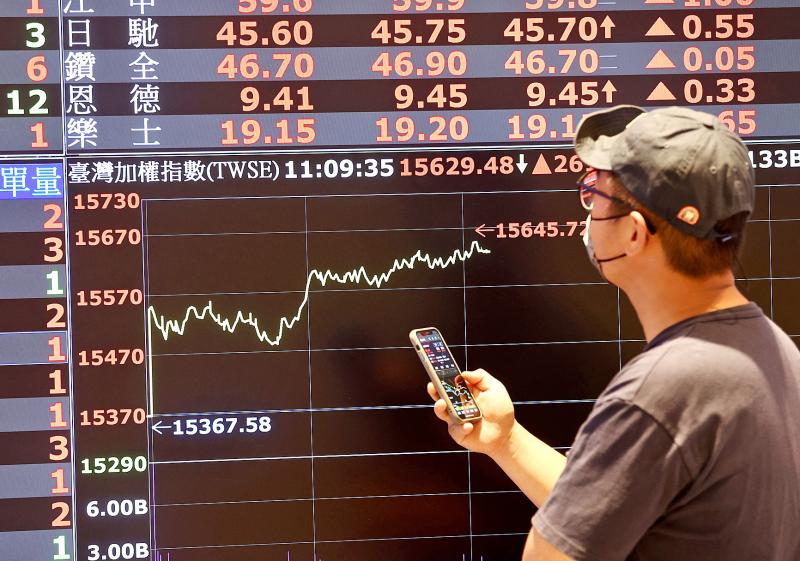Shares in Taiwan yesterday staged a solid technical rebound, surging more than 360 points as investors rushed to take advantage of a recent slump and pick up bargains, dealers said.
Buying focused on large-cap tech stocks, while financial and old economy heavyweights also rode the rebound, lending support to the broader market, dealers said.
The TAIEX closed up 361.06 points, or 2.35 percent, at the day’s high of 15,728.64. Turnover totaled NT$238.998 billion (US$8.04 billion), with foreign institutional investors buying a net NT$18.17 billion of shares on the main board, Taiwan Stock Exchange data showed.

Photo: CNA
The bellwether electronics sector, which anchored the TAIEX’s rebound, rose 2.22 percent, while the semiconductor subindex gained 1.84 percent.
“The recent selling on the local main board seems to have overshot the mark, prompting investors to pick up bargains soon after the market opened,” More Rich Securities Investment Consulting (摩爾投顧) analyst Adam Lin (林漢偉) said, referring to a decline of about 1,300 points (7.82 percent) that the TAIEX posted over the previous eight trading sessions, amid concerns about aggressive interest rate increases by the US Federal Reserve.
“With the second quarter coming to an end soon, some mutual funds are also dressing up their books for the quarter by raising their holdings to boost share prices,” Lin said. “In addition to tech stocks, financial and old economy stocks have become targets.”
The financial sector rose 3.4 percent amid hopes that a widening interest spread would boost banks’ bottom lines.
“It remains to be seen whether the main board will challenge the high technical hurdles around 16,000 points soon,” Lin said. “The TAIEX’s strength will depend on how the US markets will rebound down the road.”
In related news, Goldman Sachs Group Inc said that Taiwan-China tensions have risen to the highest in the past decade, but are now largely priced into Taiwan’s equities, based on two new indicators it has created.
The Cross-Strait Risk Index, which tracks news articles on geopolitical tensions, jumped after Russia’s invasion of Ukraine in February and the inverse correlation with broader Taiwan equities rose to the highest level in its time series, strategists, including Alvin So (蘇瑋忠) in Hong Kong and Timothy Moe (慕天輝) in Singapore, wrote in a note to clients.
“This suggests that the broader Taiwan market has started to price in cross-strait risk for the first time over the past decade,” they said.
Goldman also created a second indicator, the Cross-Strait Risk Barometer, to measure market-implied risks based on variables such as Taiwan’s tech exporters with exposure to China, as well as tourism stocks.
The analysts said the two gauges have spiked in the past three months as investors sharply priced in higher cross-strait risk and they now look to be “fairly priced.”

UNCERTAINTY: Innolux activated a stringent supply chain management mechanism, as it did during the COVID-19 pandemic, to ensure optimal inventory levels for customers Flat-panel display makers AUO Corp (友達) and Innolux Corp (群創) yesterday said that about 12 to 20 percent of their display business is at risk of potential US tariffs and that they would relocate production or shipment destinations to mitigate the levies’ effects. US tariffs would have a direct impact of US$200 million on AUO’s revenue, company chairman Paul Peng (彭雙浪) told reporters on the sidelines of the Touch Taiwan trade show in Taipei yesterday. That would make up about 12 percent of the company’s overall revenue. To cope with the tariff uncertainty, AUO plans to allocate its production to manufacturing facilities in

TAKING STOCK: A Taiwanese cookware firm in Vietnam urged customers to assess inventory or place orders early so shipments can reach the US while tariffs are paused Taiwanese businesses in Vietnam are exploring alternatives after the White House imposed a 46 percent import duty on Vietnamese goods, following US President Donald Trump’s announcement of “reciprocal” tariffs on the US’ trading partners. Lo Shih-liang (羅世良), chairman of Brico Industry Co (裕茂工業), a Taiwanese company that manufactures cast iron cookware and stove components in Vietnam, said that more than 40 percent of his business was tied to the US market, describing the constant US policy shifts as an emotional roller coaster. “I work during the day and stay up all night watching the news. I’ve been following US news until 3am

Taiwan will prioritize the development of silicon photonics by taking advantage of its strength in the semiconductor industry to build another shield to protect the local economy, National Development Council (NDC) Minister Paul Liu (劉鏡清) said yesterday. Speaking at a meeting of the legislature’s Economics Committee, Liu said Taiwan already has the artificial intelligence (AI) industry as a shield, after the semiconductor industry, to safeguard the country, and is looking at new unique fields to build more economic shields. While Taiwan will further strengthen its existing shields, over the longer term, the country is determined to focus on such potential segments as

COLLABORATION: Given Taiwan’s key position in global supply chains, the US firm is discussing strategies with local partners and clients to deal with global uncertainties Advanced Micro Devices Inc (AMD) yesterday said it is meeting with local ecosystem partners, including Taiwan Semiconductor Manufacturing Co (TSMC, 台積電), to discuss strategies, including long-term manufacturing, to navigate uncertainties such as US tariffs, as Taiwan occupies an important position in global supply chains. AMD chief executive officer Lisa Su (蘇姿丰) told reporters that Taiwan is an important part of the chip designer’s ecosystem and she is discussing with partners and customers in Taiwan to forge strong collaborations on different areas during this critical period. AMD has just become the first artificial-intelligence (AI) server chip customer of TSMC to utilize its advanced